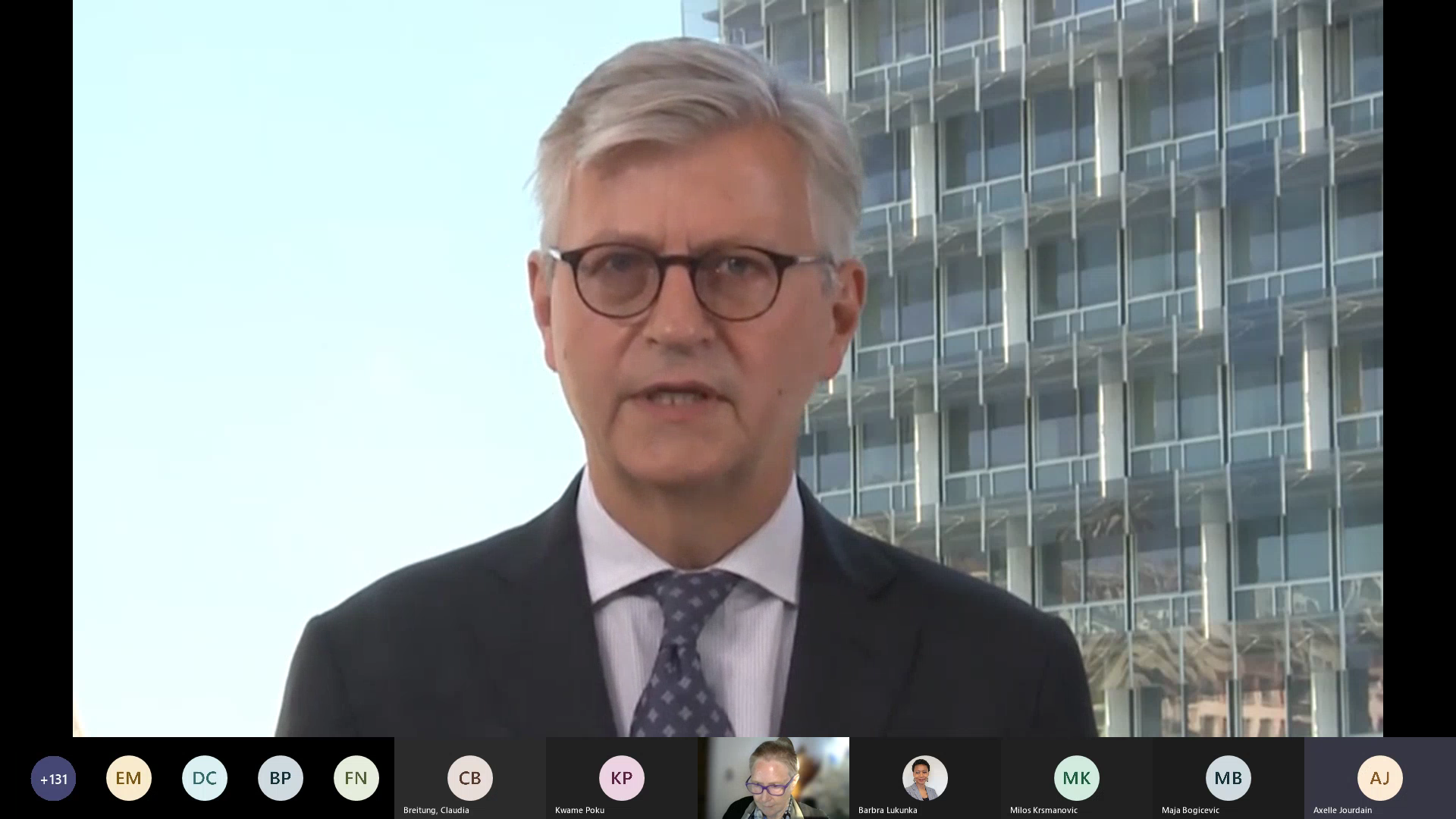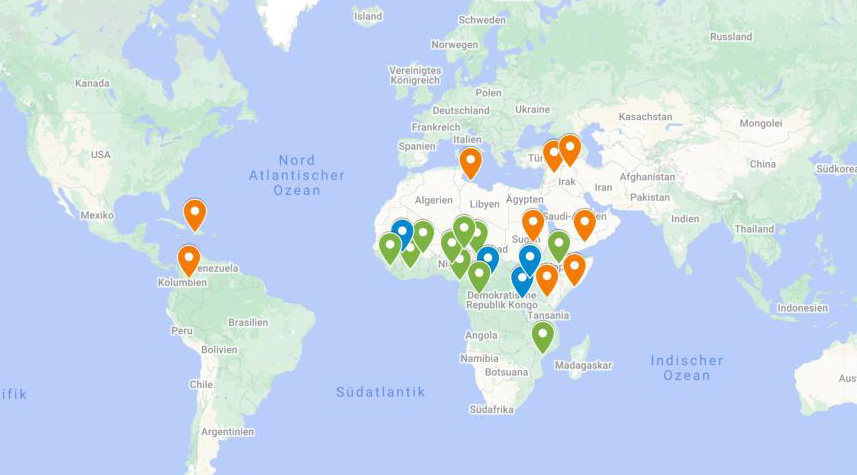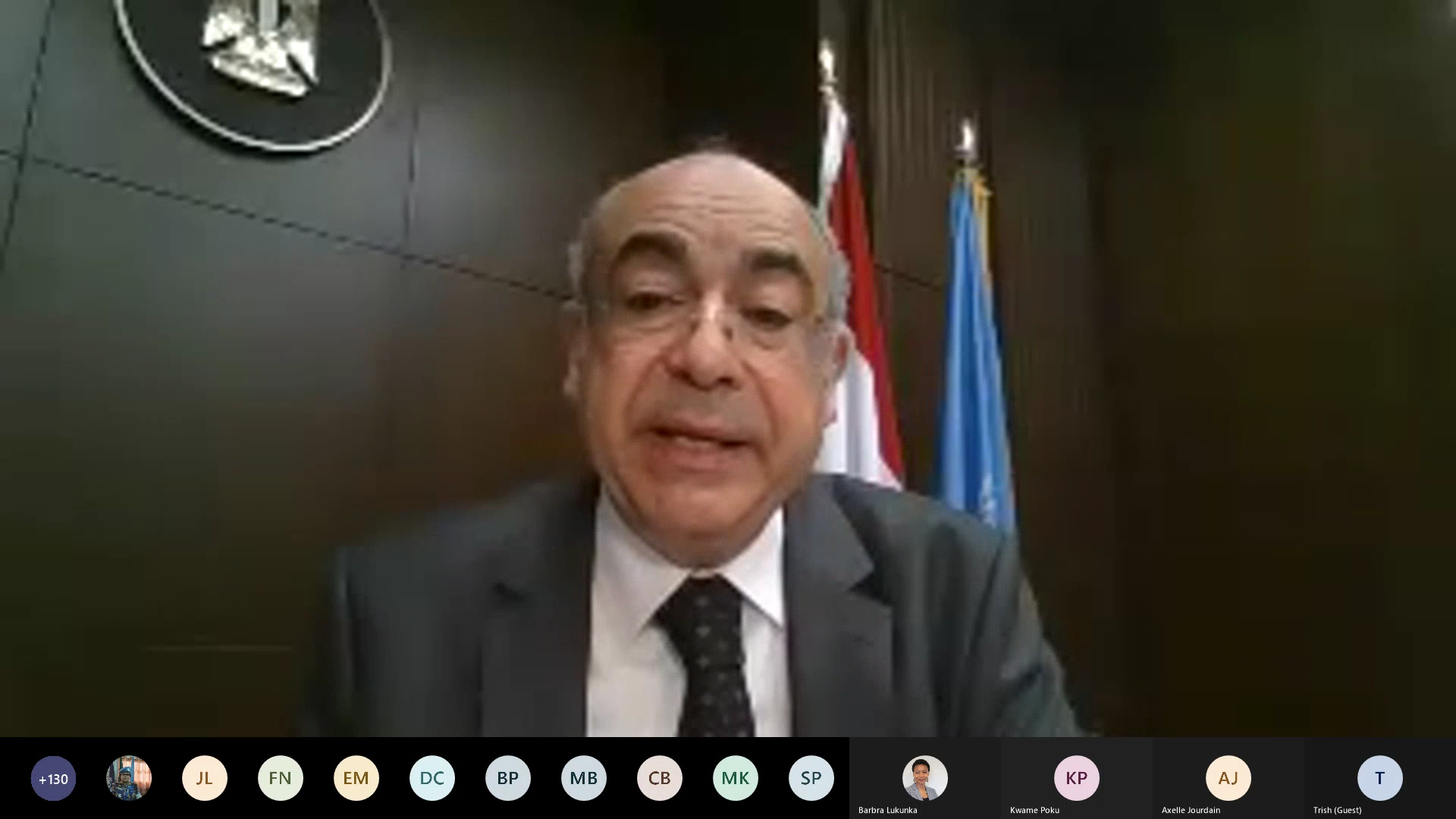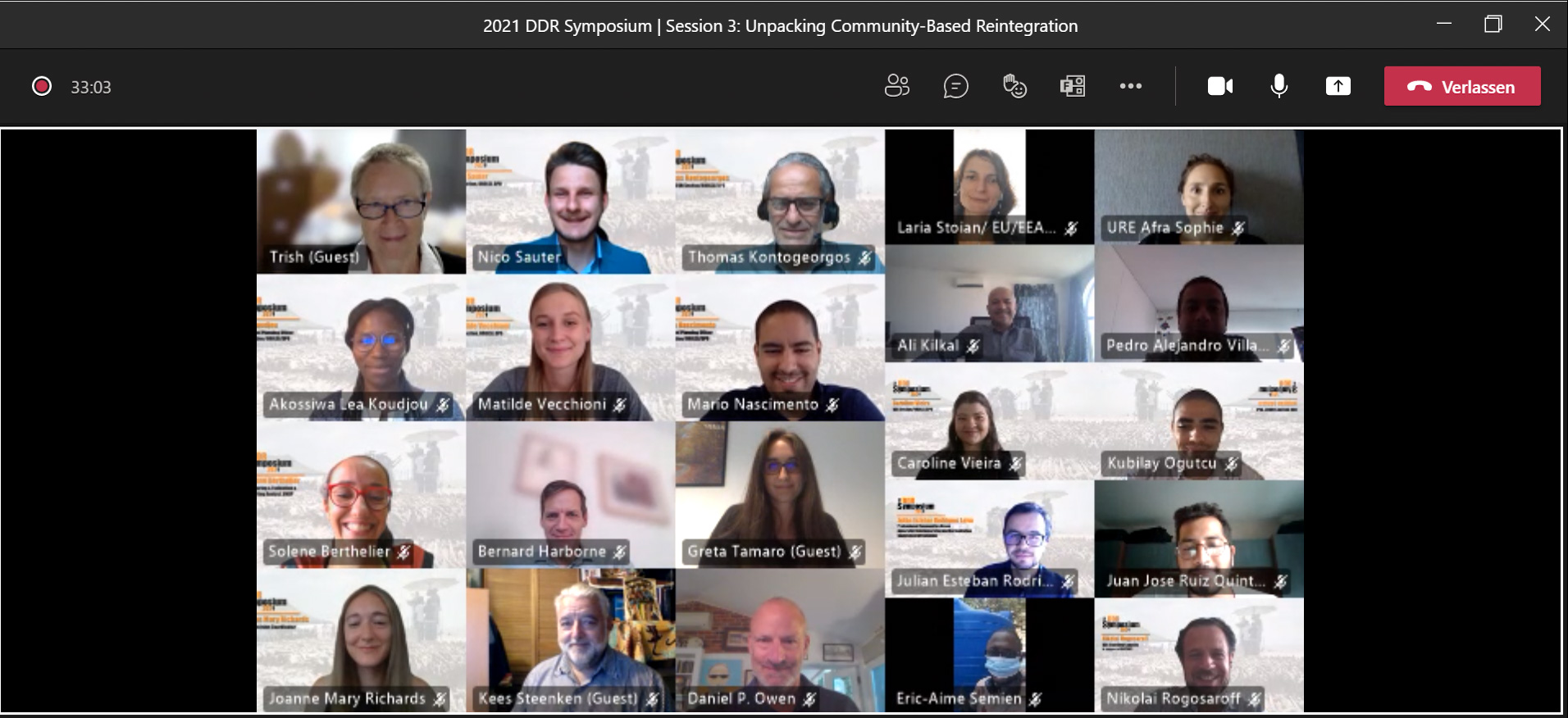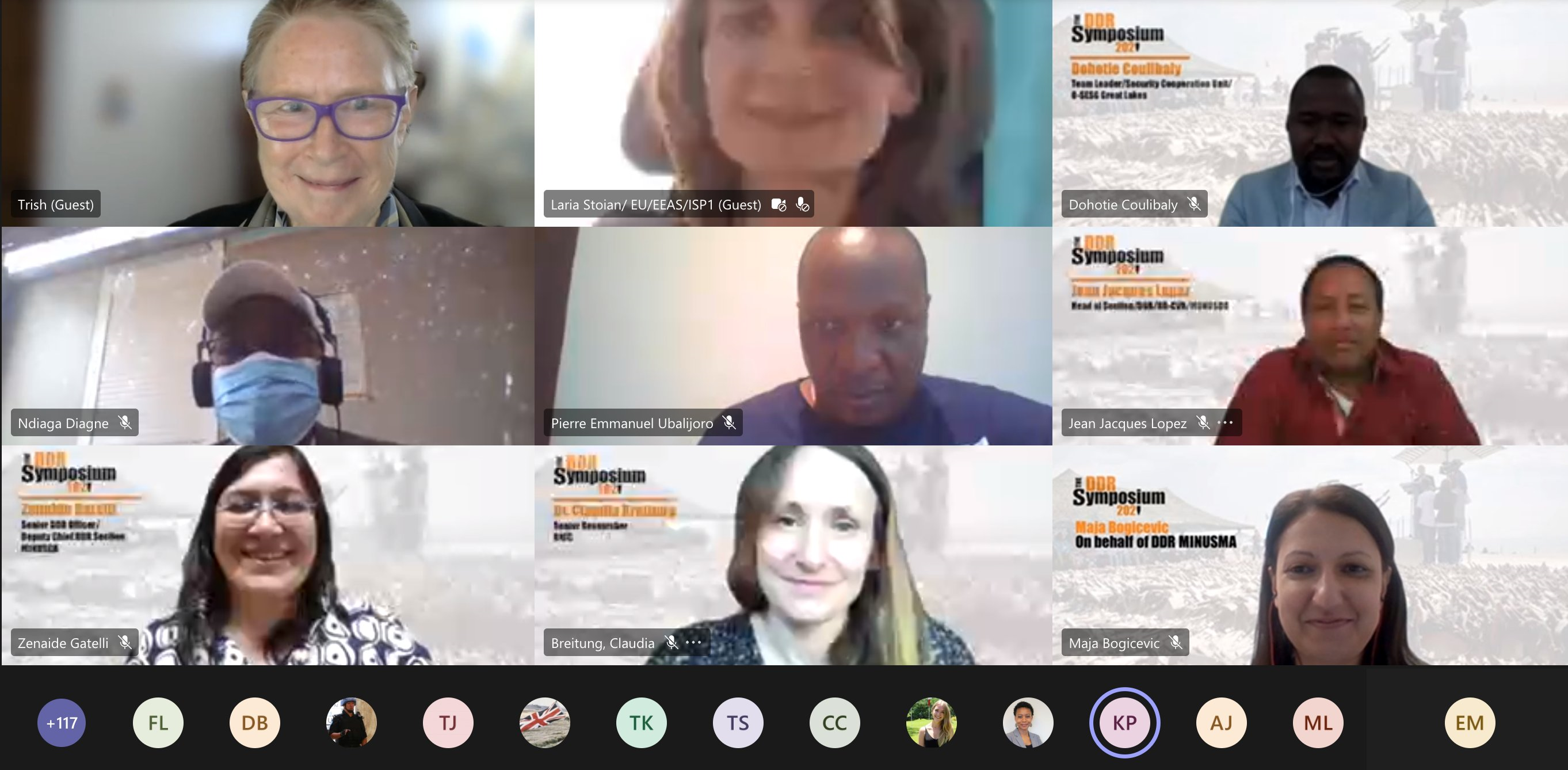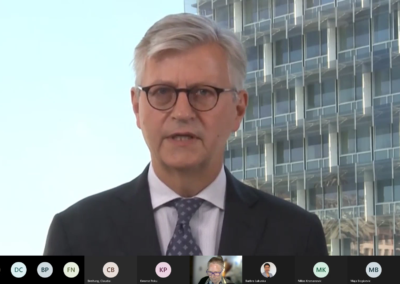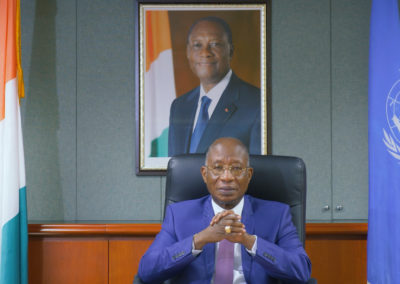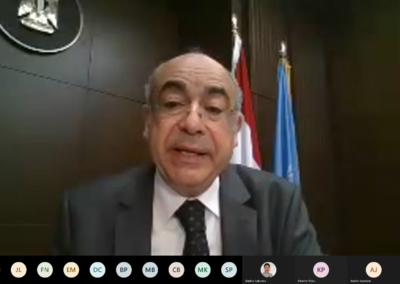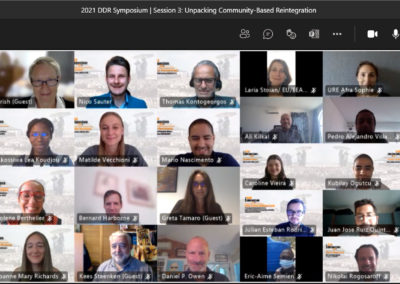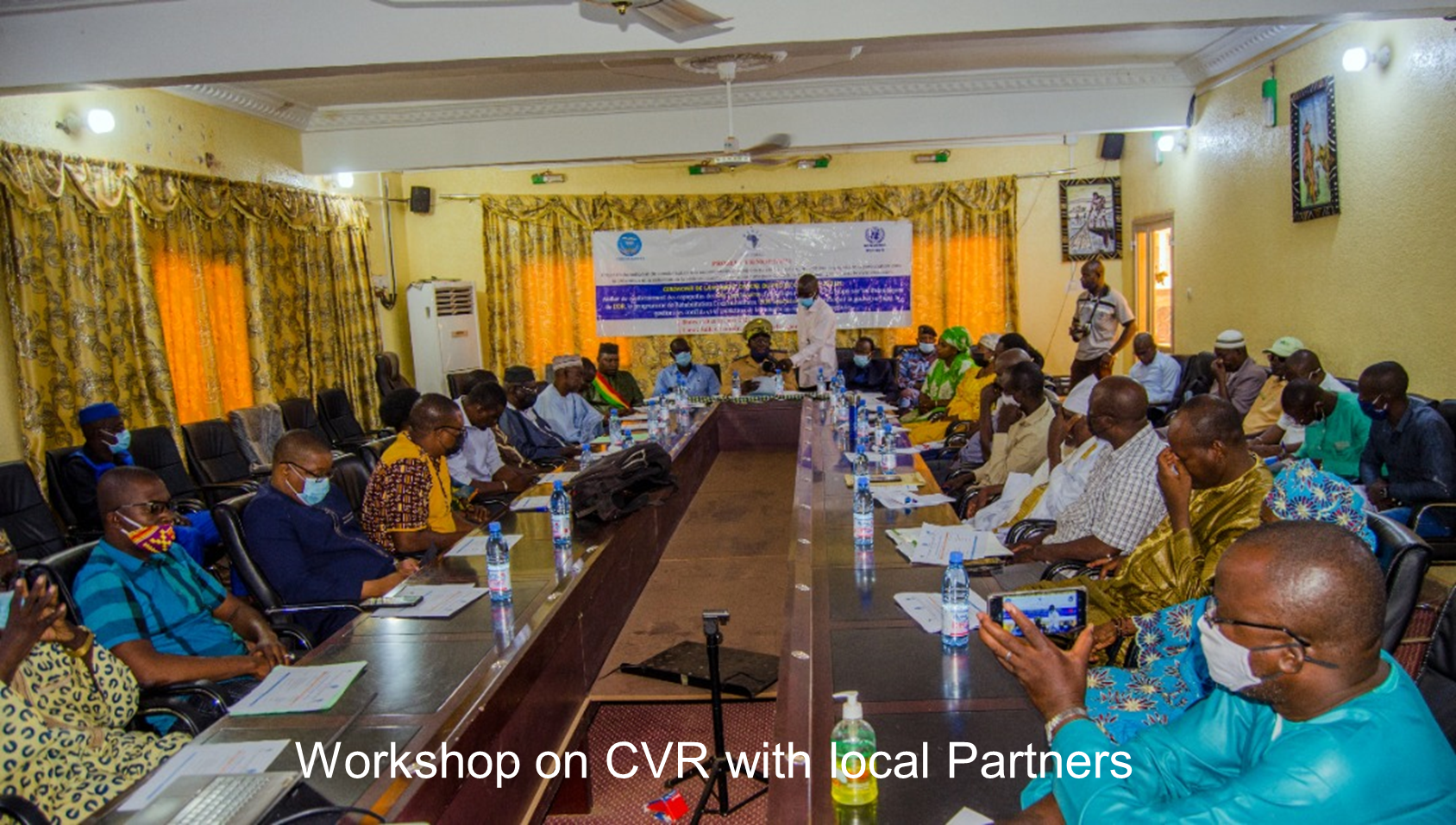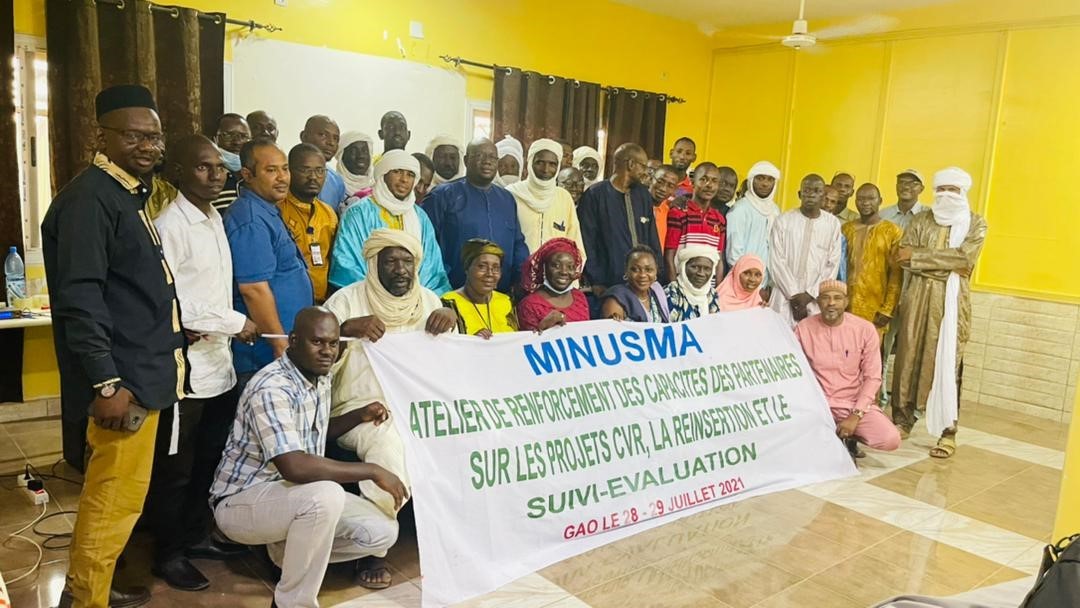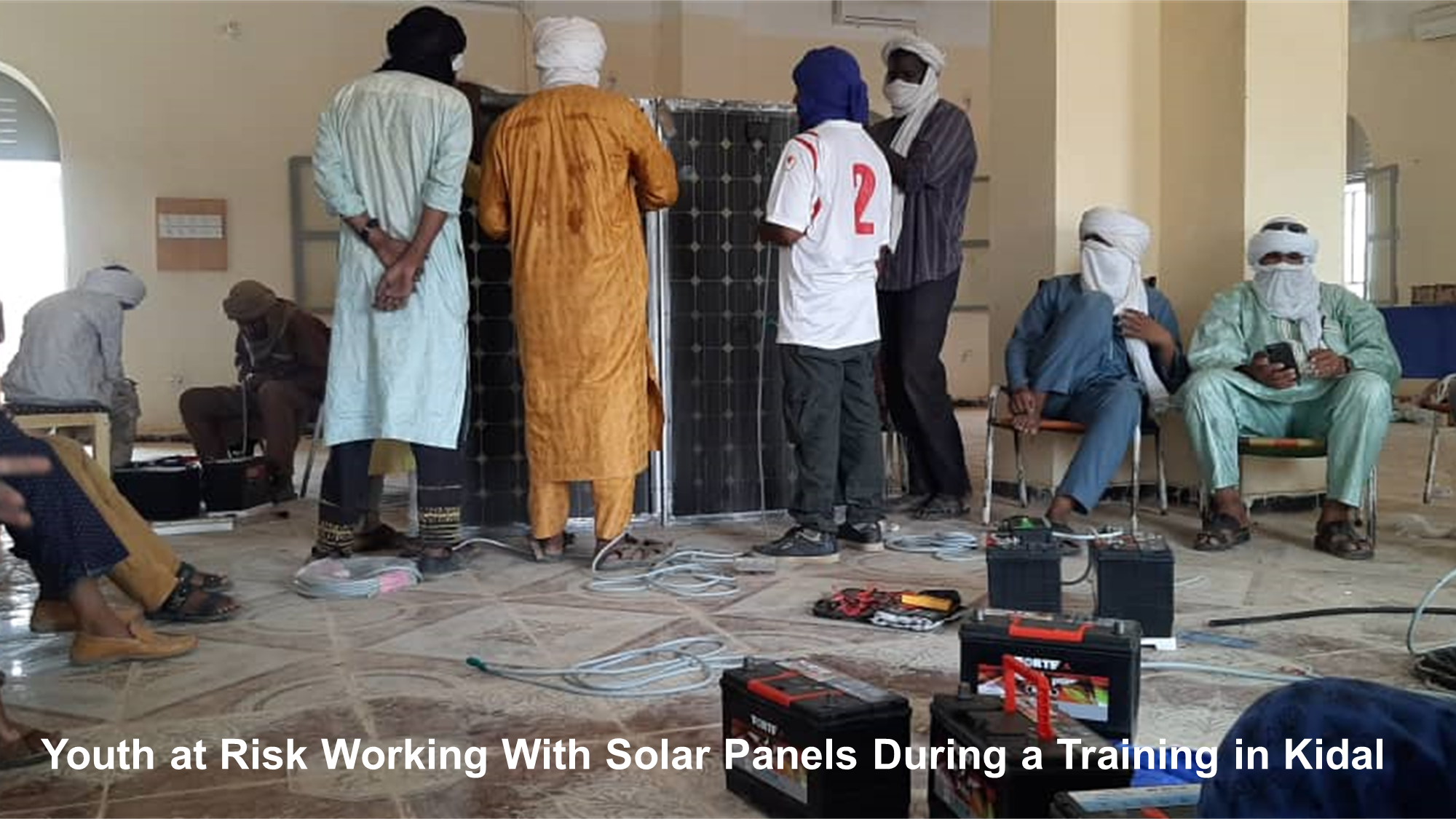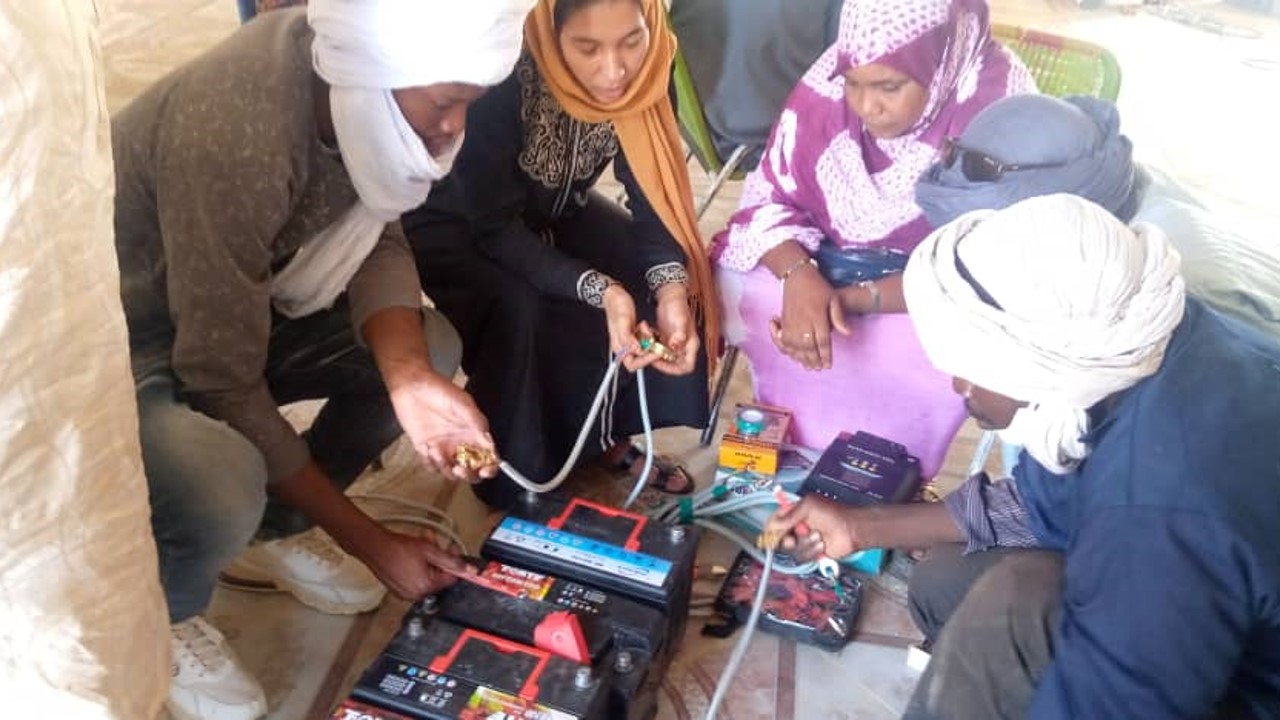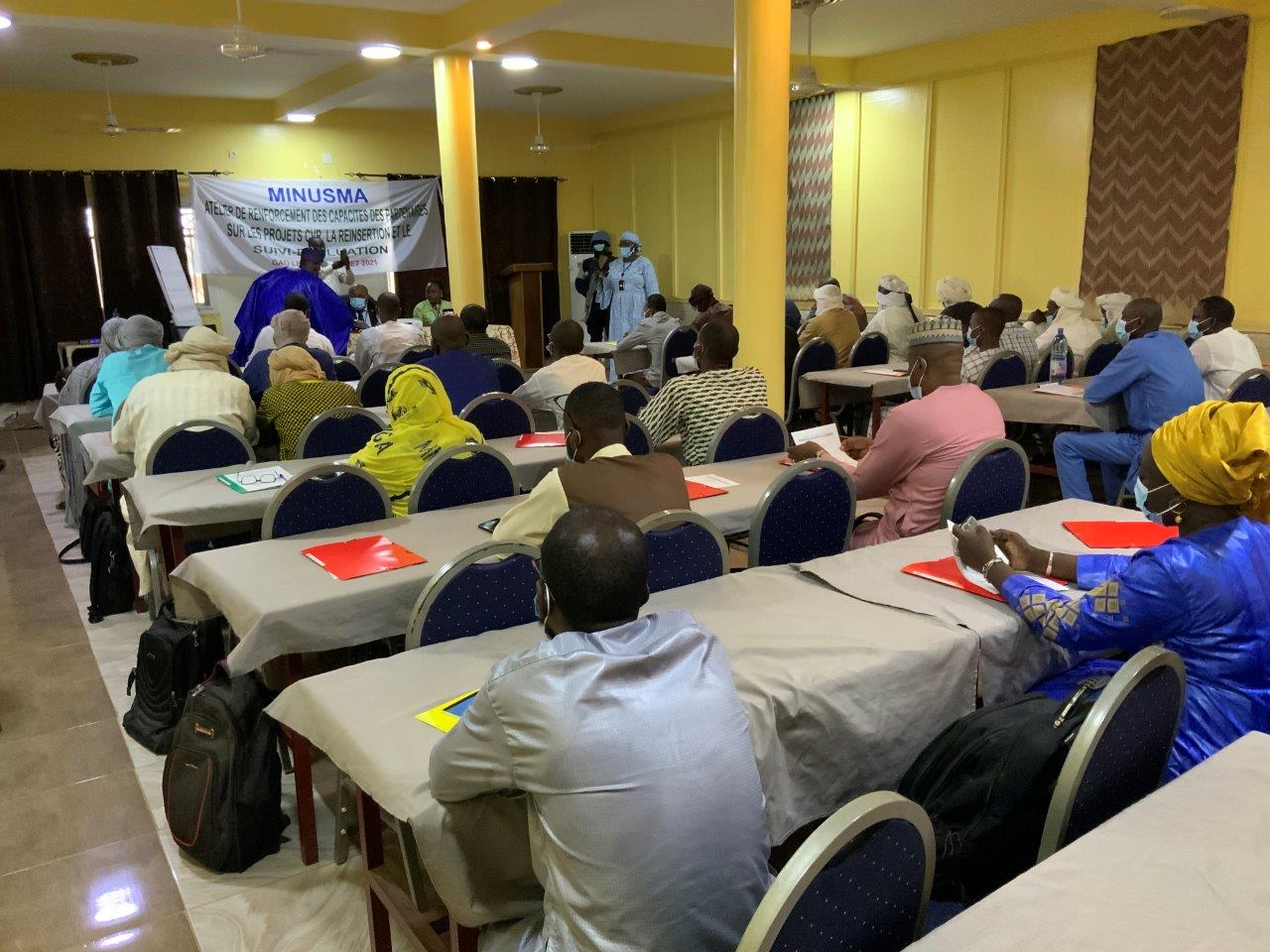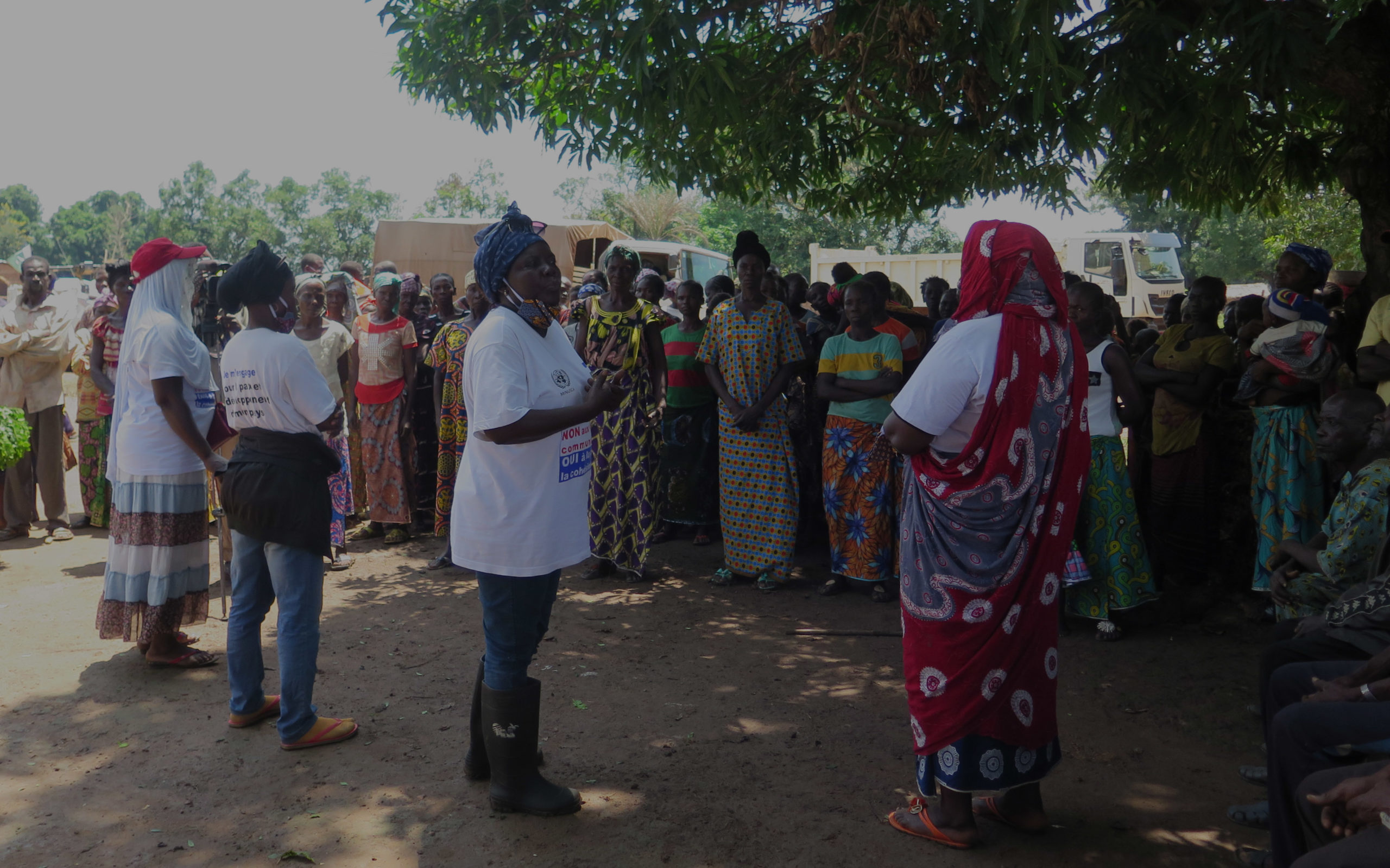CONTENTS
In focus:
The 2021 DDR Symposium
1.
Discover the missions
2.
field updates
3.
DDR and Transition processes
4.
policy and partnership updates
5.
Stories from the Field
6.
IDDRS Updates
7.
Upcoming
HIGHLIGHTS FROM THIS NEWSLETTER ISSUE
BY DPO-DDR SECTION
Under-Secretary-General for Peace Operations, Jean-Pierre Lacroix addressing the high-level meeting of the DDR Symposium
“Your contribution to the successful implementation of DDR, no matter how small it might seem, counts. DDR is a huge puzzle, and no piece can be missed.”
Anne Kroening; new Chief of MONUSCO’s DDR Section
The 2021 DDR Symposium

The annual symposium
The Annual DDR Chief’s Symposium was held virtually over a three-week period from 24 June to 15 July. The goal of the Symposium was to generate discussions among DDR practitioners and their partners on the latest developments and innovations in DDR. The Symposium was also an opportunity to take stock of challenges in DDR and to provide strategic recommendations on issues that directly or indirectly impact the work of DDR practitioners. It was a platform for experience-sharing as well as peer-to-peer exchanges, thus contributing to building blocks for a global community of DDR practice. The takeaways from the discussions throughout the event will substantially contribute to the ongoing revision of the Integrated DDR Standards (IDDRS). The entire symposium comprised of one high-level event, complemented by 5 thematic sessions conducted at the technical level, all of which were held virtually given the current COVID-19 restrictions. See the iSeek Article here.
High-Level Meeting:
Launching the DPO Study on The Future of DDR: Engaging armed groups along the peace continuum (28 June)
The DDR Section, in collaboration with the Bonn International Center for Conversion (BICC) and support from the German Ministry of Foreign affairs, has developed a study on The Evolving Nature of DDR: Engaging Armed Groups along the Peace Continuum.
The study analyzes the dynamic nature of armed conflict and identifies key phenomena as well as “frontier issues” that DDR practitioners have been encountering over recent years. These include:
-
fewer meaningful political settlements and solutions to conflicts;
-
an increase in violence by non-state actors and an increase in conflicts at local and regional levels;
-
the designation of armed groups as terrorist organizations;
-
the continued fragmentation and multiplication of armed groups;
-
the regionalisation of conflict and insecurity, including through the impacts of climate change;
-
and epidemics and pandemics in conflict settings.
The Study
The study is an attempt to analyze new trends in DDR policy and practice while also compiling lessons learned for policymakers and practitioners. It also contributes to the operationalization of the Integrated DDR Standards (IDDRS), which now cover peace operations and non-mission settings. Some findings will be useful in shaping the implementation of key system-wide initiatives, such as the Sustainable Development Goals (SDG), the Youth, Peace and Security (YPS) Agenda, the Women, Peace and Security (WPS) Agenda, as well as of efforts to strengthen the humanitarian, development and peacebuilding nexus. In particular, the findings of the study point to how DDR efforts concretely contribute to the Secretary-General’s Action for Peacekeeping (A4P) initiative, as well as the A4P+ priorities, across key commitments such as those on politics, WPS, peacebuilding, partnerships and sustaining peace.
In its analysis, the study aims to demonstrate how DDR, through its tools and community-based approaches, can serve as a platform for other mission components, implementing partners and civil society working in other areas, such as justice and corrections, police, SSR, stabilization, humanitarian action, peacebuilding and recovery.
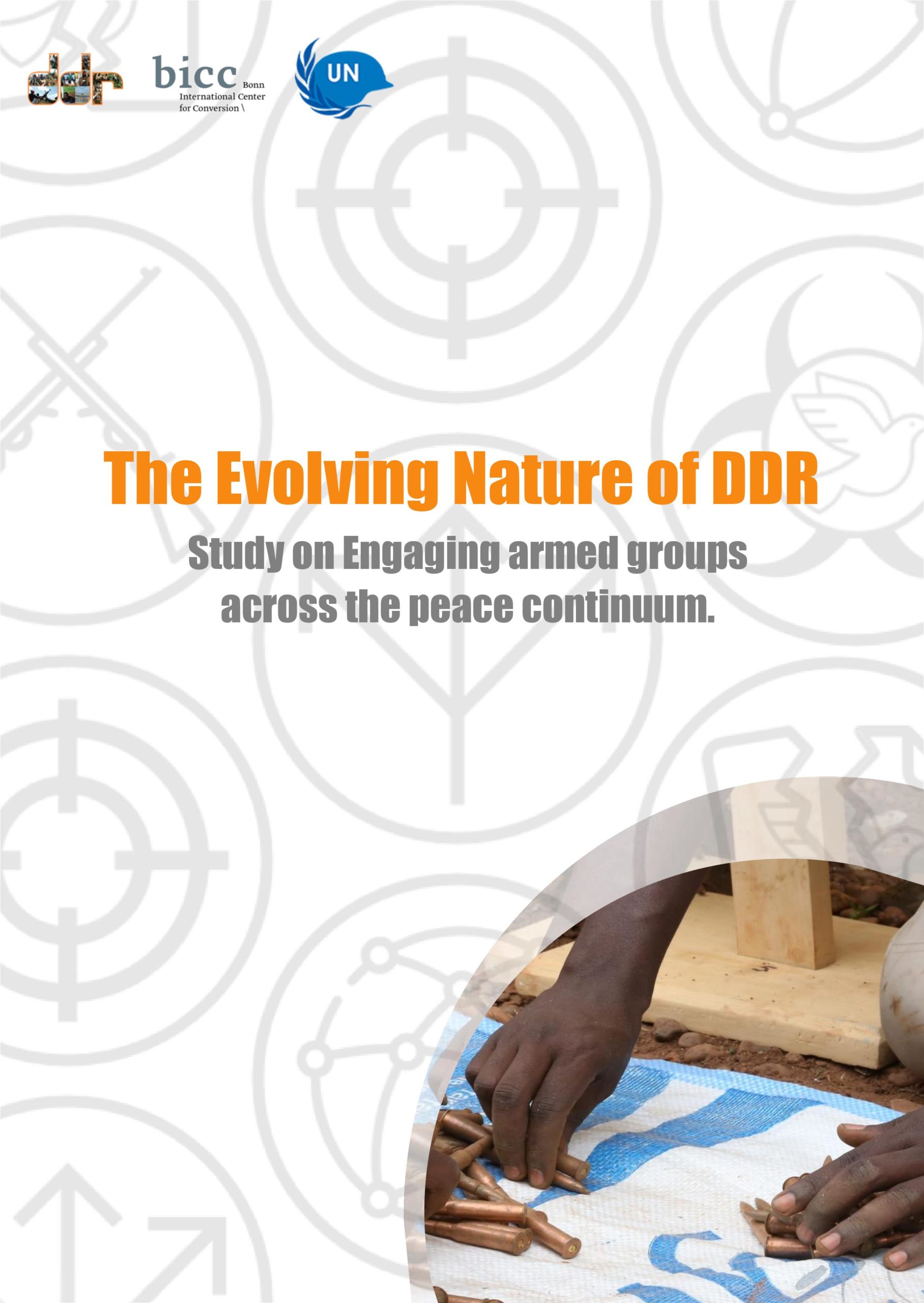
Session on Implementation of the Integrated DDR Standards (24 June)
The session offered participants an update on the ongoing IDDRS revision and the steps that will be taken to support the operationalization of the standards. Participants discussed how they currently use the IDDRS and their awareness of the new standards. The session aimed to jointly identify the steps that are needed to ensure that Chiefs of DDR components and their teams are aware of and apply the guidance outlined in the revised IDDRS. The main outcome of the session will be to jointly develop a plan for how to transfer the guidance contained in the revised IDDRS to DDR teams in the field.
Session on Operationalizing the DDR-SSR Nexus in UN Peace Operations (30 June)
DDR practitioners continue to be confronted with armed groups’ ambitions to integrate into national security forces. Because integration of armed groups into national security forces is a concern for both DDR and Security Sector Reform (SSR) practitioners, the revised IDDRS Module on DDR-SSR has been framed around integration. In addition, the DDR Section, together with the SSR Unit and the World Bank, has commissioned a scoping study on integration as a first step towards the development of joint guidance on this matter. During the session, the validated and revised IDDRS module 6.10 on DDR and SSR was presented. The discussion under this session will directly feed into the paper produced as part of the joint UN-World Bank project on integration.
Session on Evolving Partnerships to Match Evolving DDR – a tour d’horizon of the emerging New Partnership for DDR (8 July)
Partnerships in relation to DDR efforts involving international entities, national authorities and civil society in various degrees, has remained relatively stagnant over the years with multiple relevant actors working in DDR. With the current shifts in DDR, a new partnership for DDR emerges reflecting the new contexts in which DDR is implemented: from mission to non-mission settings; with new tools, such as CVR, WAM; reintegration without a DDR programme; and earlier phases in the conflict in which DDR occurs. The session discussed the factors needed to promote sustainable partnerships.
Session on Webinar on WAM in DDR Contexts (12 July)
The Department of Peace Operations (DPO) and the Office for Disarmament Affairs (ODA) are implementing a joint initiative on “Effective Weapons and Ammunition Management in a Changing DDR context”. The joint project provides resources and guidance as well as training and technical assistance to DDR practitioners in the design and implementation of tailored weapons and ammunition management (WAM) activities.
The webinar sensitized DDR practitioners and WAM experts on concepts, guidance and approaches related to disarmament operations and transitional WAM activities as part of integrated DDR processes. Participants were familiarized with available resources and support on WAM in the framework of the DPO-ODA project on “Effective WAM in a Changing DDR Context”, including through the technical assistance mechanism. Participants underlined the relevance of WAM as part of DDR and CVR and highlighted the need for guidance development, capacity building, training, research and analysis, tailored technical assistance, advocacy to political actors and outreach to communities. As a way forward, the DDRS will follow up with DDR components of the Missions to identify concrete context-specific entry-points for WAM engagement as part of DDR and support options for which the DPO-ODA technical assistance mechanism can be leveraged.
Session on Unpacking Community-Based Reintegration (15 July)
The session offered an opportunity to update participants on the progress of the revision of the IDDRS Module on Reintegration and also aimed at raising participants’ awareness of the Community-Based Reintegration (CBR) concept. CBR is an operational concept that requires greater attention by DDR practitioners, given contribution towards the effectiveness and sustainability of DDR processes. More work is needed to better understand the various comparative advantages and distinct approaches, scope, and objectives between CBR and DDR-related tools such as CVR. To this end, field practitioners and strategic partners shared their experiences to help DDR practitioners bridge existing knowledge gaps regarding CBR, with the aim of increasing awareness regarding CBR and reflecting on how CVR contributes to community-based reintegration.This session will feed directly into subsequent consultations concerning the implementation of CBR in peacekeeping operations, special political missions, and non-mission settings.
.
Discover the missions
Discover our Missions
You can find more information and highlights from the field in the interactive map below. Follow the instructions of use to further explore our highlights. We can see videos and pictures from the projects inside each of our missions and their location.
Click on the side arrows to swipe through the slide
*The boundaries and names shown and the designations used on the maps on this site do not imply official endorsement or acceptance by the United Nations. See Terms of Use.
Field updates
Timeline of field updates
(May-August)
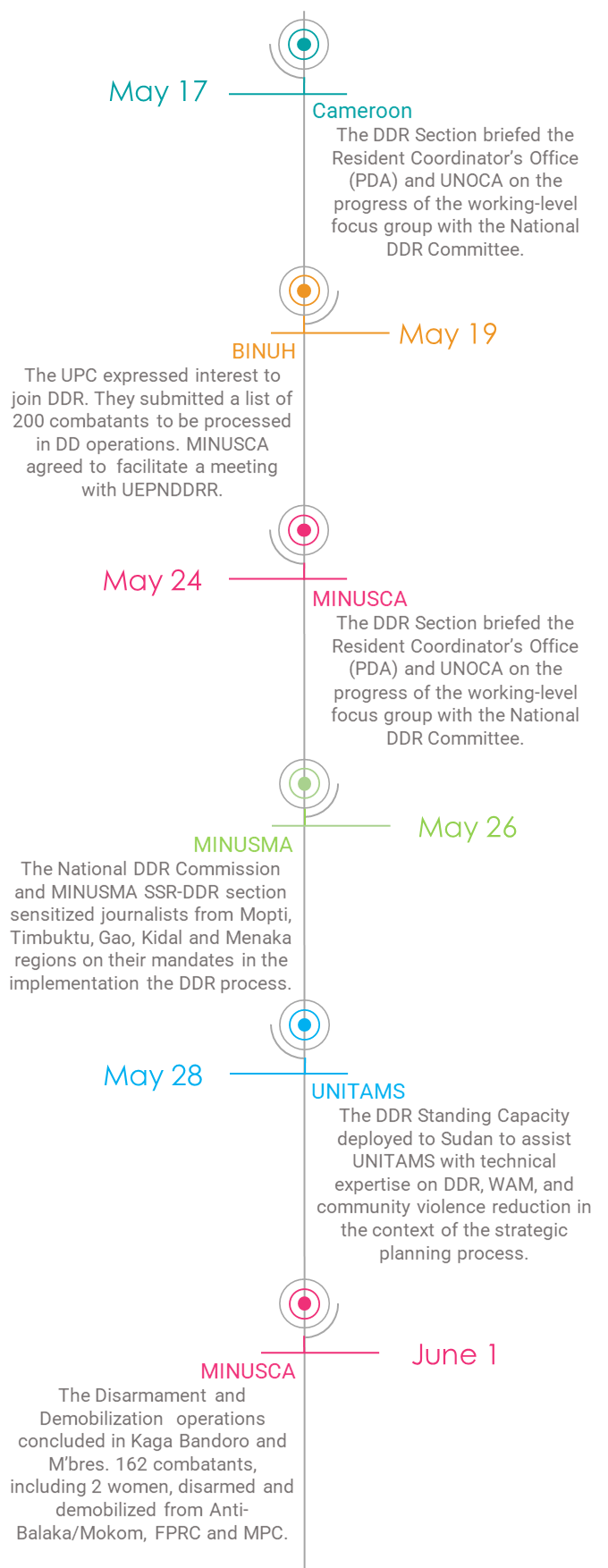
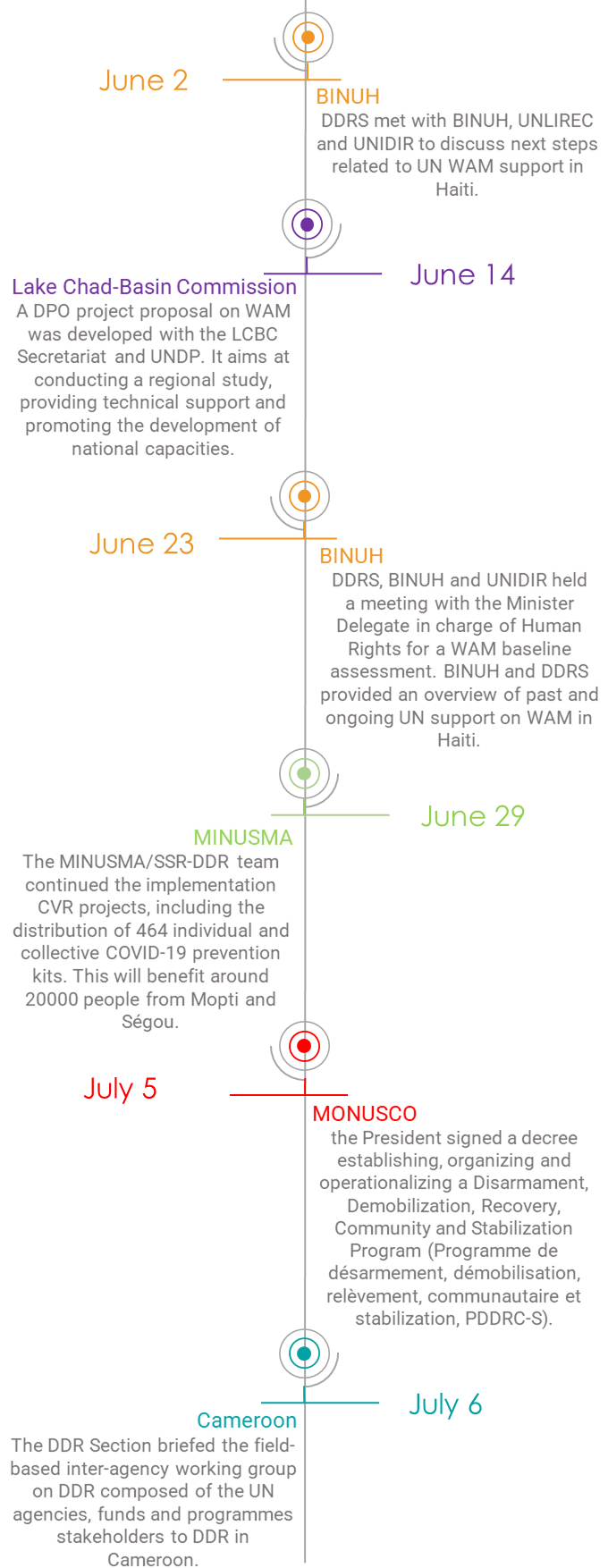
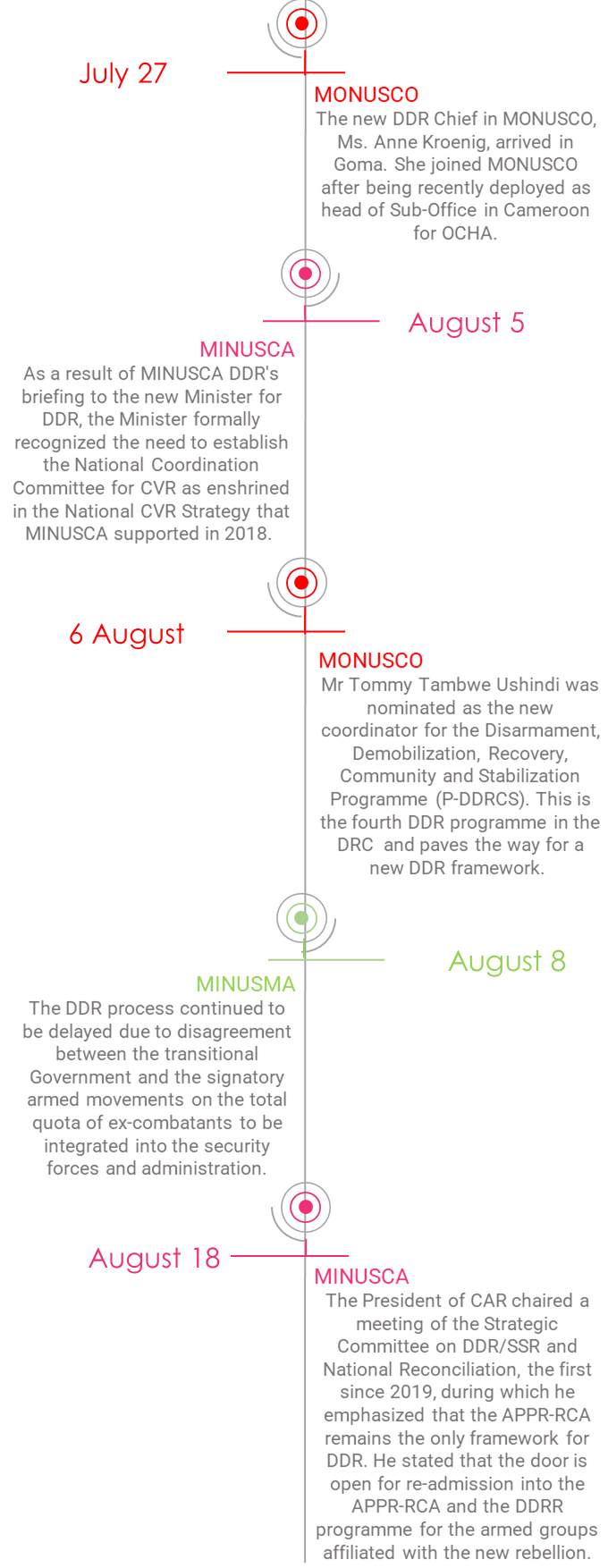
Field Updates Highlights
MINUSMA
In the last fiscal year, MINUSMA’s DDR section has invested 3.5 Million USD in 35 Community Violence Reduction (CVR) projects in Mali.
Notwithstanding the challenges caused by the COVID-19 pandemic (read more on how the Mission addressed these here), MINUSMA’s DDR section has continued to implement important CVR projects in four key regions i.e, Gao, Kidal, Mopti and Timbuktu. These projects help to reduce intercommunal violence, support social cohesion and provide local populations with alternatives to violent actions.
To enhance the capacity of local partners to implement such projects, a series of workshops was held over July and August in the regions of Mopti, Gao, Kidal and Timbuktu, engaging local NGOs and sharing best practices to contribute efficiently to social cohesion and peace. One concrete example of a CVR project that shows the synergetic effects of such measures is a training programme on renewable energy sources, recently organized in Kidal. The project not only provides youths at risk with valuable skills and alternatives to violence, but also helps the wider community address energy insecurities in a sustainable manner.
Click on the side arrows to swipe through the gallery
Minusca Focus
The new information bulletin from MINUSCA puts the spotlight on CVR
In its newest information bulletin, MINUSCA puts the spotlight on DDR and CVR in the Central African Republic. With insights into the way towards reintegration for ex-combatants and an interview with UEPNDDRR Coordinator Samuel Touatena, who discusses the contribution of DDR operations to the return of peace. You will furthermore read about MINUSCA’s outreach efforts to contribute to peace and community stabilization. The bulletin also reports on the Mission’s various actions to help improve the population’s living conditions through the construction of infrastructure and the development of local income-generating activities.
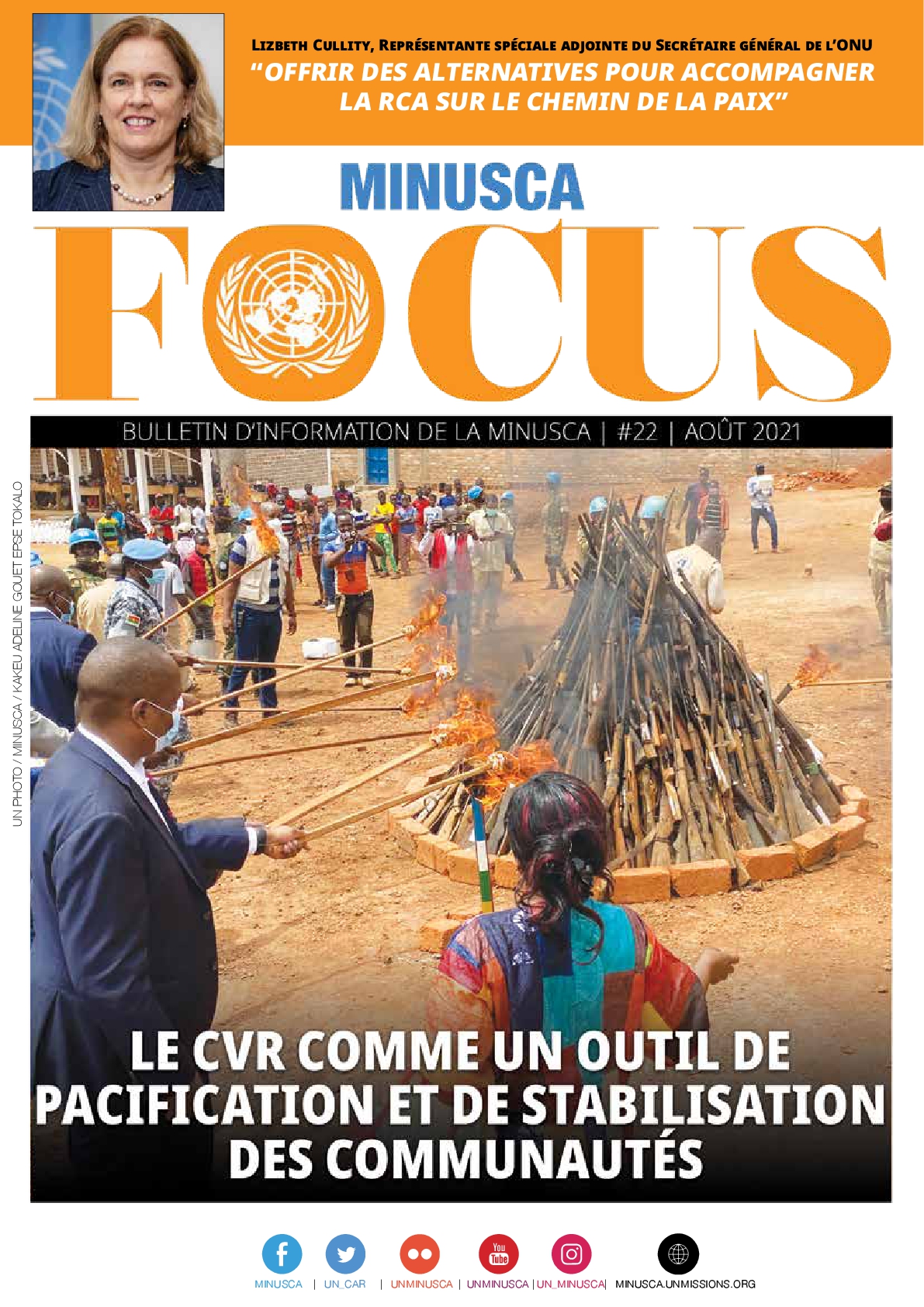
DDR and transition processes
What happens to DDR during transitions?
UN transition is the process through which activities performed by a peace operation are gradually transferred to national authorities or another UN presence such as the UN Country Team (UNCT). It may also refer to the reconfiguration of UN presence from Peacekeeping Operations (PKOs) to Special Political Missions (SPMs). This process represents a key milestone in the lifespan of a peacekeeping operation and mission components, including Disarmament, Demobilization and Reintegration (DDR) sections, as the UN footprint significantly decreases following the transition process. To ensure consolidation and sustainability of DDR gains post-transition, including Community Violence Reduction (CVR), DDR practitioners need to plan for transition as early as possible.
To this end, the OROLSI DDR Section launched the Disarmament, Demobilization and Reintegration (DDR) and Transition Planning Processes: Lessons Learned from Recent Transition Processes guide. The paper outlines lessons learned from recent transition processes and presents a series of recommendations aimed at assisting practitioners to effectively prepare and contribute to transition processes at the headquarters and field levels. The specific cases of the recent transition processes in Haiti and Sudan have shown that there is no universal blueprint for successful transitions.

Policy and Partnership updates
MINUSMA Mandate Renewal: Resolution 2584 (2021)
On 29 June 2021, The Security Council unanimously decided to renew the mandate of the United Nations Multidimensional Integrated Stabilization Mission in Mali (MINUSMA) until 30 June 2022.
Unanimously adopting resolution 2584 (2021) under Chapter VII of the Charter of the United Nations, the 15-member organ called on all Malian stakeholders to facilitate the full realization of the political transition and handover of power to elected civilian authorities within the 18-month transition period, as decided during the 15 September 2020 meeting of the Economic Community of West African States (ECOWAS). Mali’s Transitional Government must also organize free and fair presidential and legislative elections, scheduled for 27 February 2022, along with regional and local elections and a constitutional referendum, as appropriate, within that 18-month time frame.
By other terms, the Council called on all parties in Mali to strictly abide by the arrangements in place for a cessation of hostilities and demanded that all armed groups cut all ties with terrorist organizations and transnational organized crime. They must also end the recruitment and use of child soldiers and cease any activities hampering the return of State authority and basic social services.
More specifically, the council called for the redeployment of all the elements who underwent the accelerated DDR process, the integration into the MDSF and training of 2,000 additional elements of the signatory armed groups, and the launch of socio-economic reinsertion of ex-combatants willing to return to civilian life. The Council also urged Malian authorities to disarm without delay all militias, reinforce reconciliation initiatives, and advance community violence reduction efforts. In addition, MINUSMA will be assisting the Malian authorities with the removal and destruction of mines and other explosive devices and weapons and ammunition management, within existing resources.
Further, the Council called for the inclusion within national and regional strategies of programmes that address the stigma of sexual and gender-based violence, bring justice to victims and survivors, and support their reintegration into their communities.
General Assembly Resolution 75/291 on the United Nations Global Counter-Terrorism Strategy: seventh review
On 30 June 2021, the General Assembly adopted resolution 75/291 on the seventh review of the United Nations Global Counter-Terrorism Strategy.
In this resolution, the Assembly recognized that to address the underlying causes of terrorism, “the determination of Member States to work towards conflict resolution, to confront oppression, to eradicate poverty, to promote sustained economic growth, sustainable development, global prosperity, good governance, human rights and fundamental freedoms” is indispensable.
By stressing “the importance of ensuring that efforts to implement disarmament, demobilization and reintegration programmes, in accordance with international human rights law and international humanitarian law, are mindful of the United Nations Global Counter-Terrorism Strategy, relevant Security Council resolutions and relevant international instruments relating to counter-terrorism;” the General Assembly acknowledged the complementarity among interventions, notably DDR, and the need for coordination amongst actors. In multiple countries, most prominently the Lack Chad Basin, Mali, Somalia, DDR activities are conducted in contexts where armed groups designated as terrorist organizations (AGDTOs) operate. This poses a plethora of operational and programmatic as well as political and conceptual challenges. With the support of the European Union and Folke Bernadotte Academy, the Inter-agency Working Group on DDR (which encompasses 26 UN entities) developed a new IDDRS module on AGDTO.
The module will provide clear operational guidance to DDR practitioners supporting individuals who voluntarily left AGDTO and/or operating in environments where these actors are present. It was developed based on extensive literature review, field missions and broad consultations among UN actors. This included over 100 interviews, multiple workshops and draft revisions. After receiving conditional validation of several IAWG entities in March 2021, the document is under final review prior to official adoption

Weapons and Ammunition Management
Dedicated WAM and DDR roster of experts established.
In the context of the joint DPO-ODA “Effective Weapons and Ammunition in a changing DDR context” project, a dedicated WAM & DDR roster of experts was established. Its purpose is to support the operationalization of the standing DPO-ODA Technical Assistance Mechanism under the joint project. The mechanism provides concrete strategic, policy and technical assistance on WAM to UN peace operations, Resident Coordinator Offices and national authorities. 82 experts (18 women and 34 men) were admitted to the roster.
On 27 May, DPO and ODA hosted a webinar for the members of the roster, bringing together policy and technical experts from UN entities, international, regional and sub-regional organizations, as well as expert training and research institutions. The webinar introduced the various support options offered in the framework of the DPO-ODA mechanism, including advice on policy and guidance development, the development and delivery of tailored trainings on WAM, as well as the deployment of technical assessment missions or the facilitation of regional or national studies on weapons and ammunition dynamics. The event was also an opportunity to present the recently released 2nd edition of the Handbook for DDR practitioners on WAM. To build an engaging and active network, the United Nations Institute for Training and Research (UNITAR) introduced the online community of practice “WAM & DDR Hub”. The Hub is available to the experts as a platform for the exchange of knowledge, experiences and ideas, as well as peer-support and networking.
TESTIMONIals From the Field
Aichatou Maiga – A Perspective from National DDR Staff in Mali
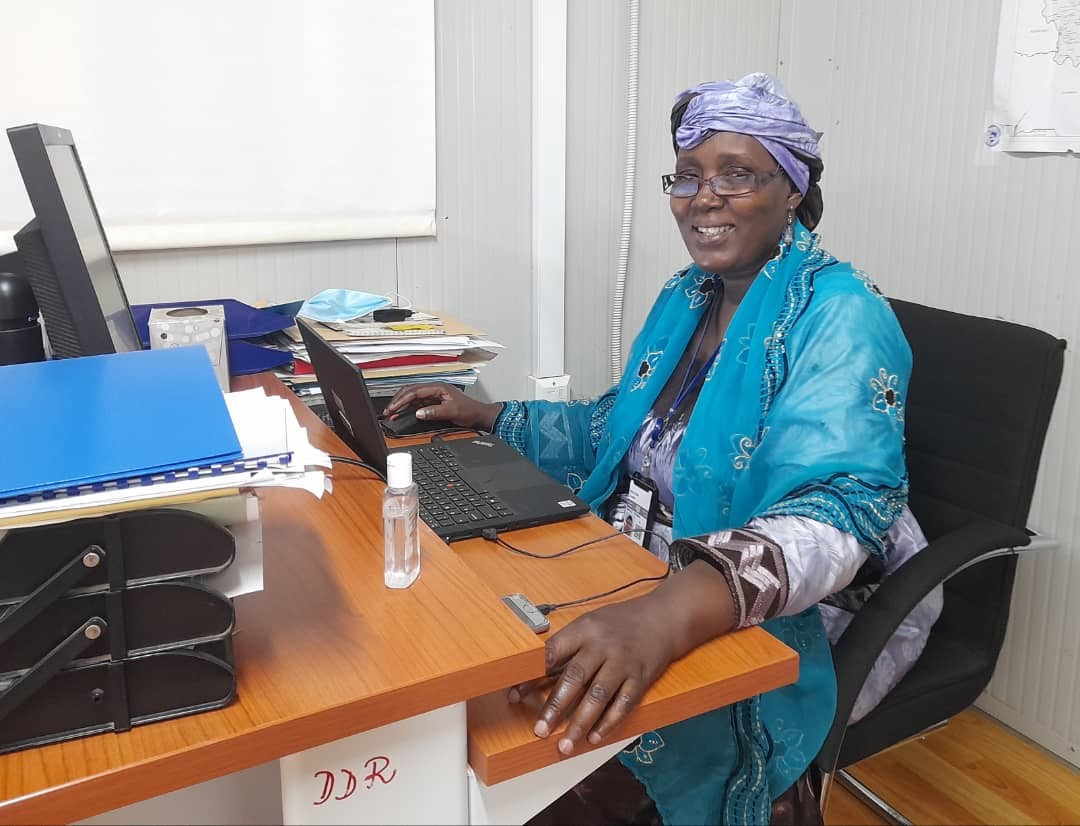
Ms Maiga is colloquially known as ‘Mama DDR’ amongst the MINUSMA team in Gao.
How did your previous career lead you to work in the DDR field?
 Before joining the DDR section on MINUSMA, I worked in an international NGO as an outreach officer. Then worked for the Association for the Rights of Malian Women as a sensitization officer and an NGO for the control of Small Arms, and for the Association for the Development of Youth and Women in Mali as a coordinator. These personal experiences enabled me to enhance my knowledge to work in a hard and challenging environment in order to address various issues.
Before joining the DDR section on MINUSMA, I worked in an international NGO as an outreach officer. Then worked for the Association for the Rights of Malian Women as a sensitization officer and an NGO for the control of Small Arms, and for the Association for the Development of Youth and Women in Mali as a coordinator. These personal experiences enabled me to enhance my knowledge to work in a hard and challenging environment in order to address various issues.
For example, while working in an international NGO’s mine advisory group, one of my tasks was to advise communities on the dangers of mines and improvised explosive devices and how to take precautionary measures. I used to conduct outreach activities both in French and Songhai, one of the local languages. Working in various national and international NGOs helped me develop my skills in drafting and analyzing various reports, working in a diverse and multicultural environment and teamwork culture. All these transferable skills helped me in my selection for the job in DDR.
Looking back at your career in the DDR team, what was the most impactful experience that changed you as a person?
 In my position as a DDR sensitization officer, my language skills helped me better understand the concept of cantonment and DDR processes to conduct field missions for the sensitization of communities and the members of the signatory armed movements to the peace agreement on cantonment and DDR and CVR projects. In doing so, my most impactful experience was the understanding of the value of peace dividends.
In my position as a DDR sensitization officer, my language skills helped me better understand the concept of cantonment and DDR processes to conduct field missions for the sensitization of communities and the members of the signatory armed movements to the peace agreement on cantonment and DDR and CVR projects. In doing so, my most impactful experience was the understanding of the value of peace dividends.
Our work is enabling the development of social cohesion among communities and providing temporary job opportunities to the beneficiaries, especially for women and youth at risk through the implementation of CVR projects, confidence-building measures and the integration of the ex-combatants in the Malian Defense and Security Forces. Furthermore, experiencing MINUSMA’s ethos of keeping and building peace in Mali in the vital area for security that is DDR, was crucial for me.
How has DDR adapted to operational challenges in complex environments? Which new tools allow community members to participate in a DDR process?
 Mali’s political and security dynamics are very challenging and coupled with a low availability of state authorities and economic problems such as a lack of job opportunities, thus exposing the youth to potential recruitment by terrorist groups. In such an environment, the implementation of CVR projects was found to be a valuable tool to provide peace dividends.
Mali’s political and security dynamics are very challenging and coupled with a low availability of state authorities and economic problems such as a lack of job opportunities, thus exposing the youth to potential recruitment by terrorist groups. In such an environment, the implementation of CVR projects was found to be a valuable tool to provide peace dividends.
Implementation of these CVR projects started when there was no legal framework, such as a peace agreement, in place to begin the disarmament process. These projects created an environment for peace, social cohesion and dialogue amongst various communities, in addition to providing livelihood opportunities for community members.
What do you think is necessary to move forward with DDR in Mali?
 Moving forward the DDR process in Mali depends on the political willingness of the signatory parties to the peace agreement to find real common ground and to put aside all personal or regional political interests. Signatory parties need to understand that DDR is a national owned program, and its effective implementation is essential for long-lasting peace in the country. There is also a need to involve women and youth in the national structures because the effective implementation of the process should come from the grassroots level. To that end, strong advocacy by the mission’s senior leadership for the continuation of the DDR process is necessary.
Moving forward the DDR process in Mali depends on the political willingness of the signatory parties to the peace agreement to find real common ground and to put aside all personal or regional political interests. Signatory parties need to understand that DDR is a national owned program, and its effective implementation is essential for long-lasting peace in the country. There is also a need to involve women and youth in the national structures because the effective implementation of the process should come from the grassroots level. To that end, strong advocacy by the mission’s senior leadership for the continuation of the DDR process is necessary.
How can the United Nations effectively promote gender-responsive interventions?
 Strong advocacy by the mission and the international community towards all national stakeholders and institutions to effectively promote gender balance in various state institutions and bodies for the inclusion of women, youth and minorities on all levels of decision making is crucial. This is a continual effort to be made to get these groups, especially women, to recover confidence in themselves and speak with one voice for the stability, recovery, and development of the country.
Strong advocacy by the mission and the international community towards all national stakeholders and institutions to effectively promote gender balance in various state institutions and bodies for the inclusion of women, youth and minorities on all levels of decision making is crucial. This is a continual effort to be made to get these groups, especially women, to recover confidence in themselves and speak with one voice for the stability, recovery, and development of the country.
What advice would you give a young girl who aspires to work in your field one day?
 Very interesting question. First of all, I would advise the young girl to prepare herself to face competition and adversity in her life by educating herself. Many opportunities will be outside her comfort zone. Girls need to work hard and go beyond the limits set by gender concepts to be able to grab opportunities. Secondly, each girl has individual capacities and needs to look on the bright side and should put all their efforts into the betterment of their country.
Very interesting question. First of all, I would advise the young girl to prepare herself to face competition and adversity in her life by educating herself. Many opportunities will be outside her comfort zone. Girls need to work hard and go beyond the limits set by gender concepts to be able to grab opportunities. Secondly, each girl has individual capacities and needs to look on the bright side and should put all their efforts into the betterment of their country.
Mediation on the ground – The work of an Implementing partner
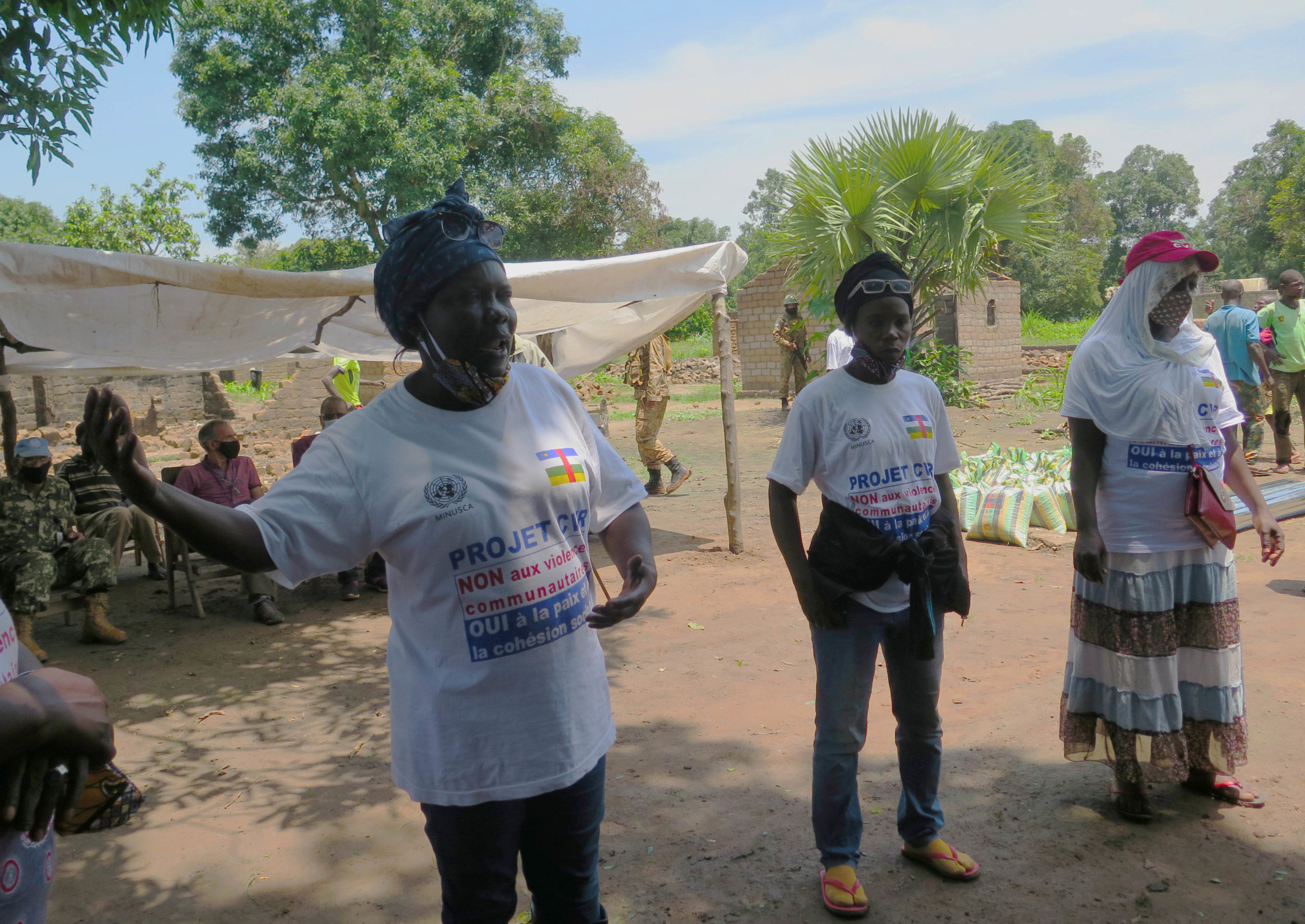
Olga Simandele
When conflict breaks out in the communities of Kaga-Bandoro and surrounding areas of the Nana-Grébizi prefecture in the Central African Republic (CAR), Olga Simandele, a neutral third party, is at the forefront of mediation efforts to ensure peace and social cohesion.
What motivated you to conduct these sensibilization measures?
 An inter-community conflict broke out in the localities of Nrgrevai-Kotamalé in mid-May this year – resulting in 14 deaths, three injuries, and the massive displacement of people to a new camp for Internally Displaced Persons (IDPs) in Kaga-Bandoro. When the crisis broke out, the MINUSCA DDR section called on us, as a Neutral Third Party (TPN), to raise awareness on the maintenance and consolidation of peace and the free movement of people. For almost a month now, the TPN has conducted activities to advocate for peaceful coexistence among warring communities.
An inter-community conflict broke out in the localities of Nrgrevai-Kotamalé in mid-May this year – resulting in 14 deaths, three injuries, and the massive displacement of people to a new camp for Internally Displaced Persons (IDPs) in Kaga-Bandoro. When the crisis broke out, the MINUSCA DDR section called on us, as a Neutral Third Party (TPN), to raise awareness on the maintenance and consolidation of peace and the free movement of people. For almost a month now, the TPN has conducted activities to advocate for peaceful coexistence among warring communities.
Which concrete activities have you implemented?
 We have canvassed 11 villages in the area to engage with the local population on important themes such as social cohesion, forgiveness, the right to free movement for all people in surrounding communities, the danger of holding weapons, etc. We meet with village and neighborhood leaders who help facilitate our work.
We have canvassed 11 villages in the area to engage with the local population on important themes such as social cohesion, forgiveness, the right to free movement for all people in surrounding communities, the danger of holding weapons, etc. We meet with village and neighborhood leaders who help facilitate our work.
People are afraid, and most of them have lost their homes and belongings. We tell them about the activities of the Community Violence Reduction (CVR) programme in their villages. The CVR initiative conducts Cash-for-Work project activities, including the provision of metal sheets for the restoration of damaged homes and seeds for cultivation, and the construction of markets and village sanitation facilities. This gives these people hope and encourages them to return to their villages.
What has been the impact of your activities?
 People living in IDP camps are beginning to return to their homes, and contact between villages has resumed. Communities are voluntarily getting rid of the weapons they have and handing them over to MINUSCA. We see that houses that were destroyed are being rebuilt with the support of MINUSCA’s DDR Cash-for-Work project.
People living in IDP camps are beginning to return to their homes, and contact between villages has resumed. Communities are voluntarily getting rid of the weapons they have and handing them over to MINUSCA. We see that houses that were destroyed are being rebuilt with the support of MINUSCA’s DDR Cash-for-Work project.
What is the contribution of women in this peace and social cohesion process?
 Four out of 10 members on the Tierce Partie Neutre are women. We are very much involved in the peace process: we participate in all advocacy activities organized in communities in conflict on the Ngrevai-Kotamale axis. Fortunately, women are listened to a lot in cases of conflict.
Four out of 10 members on the Tierce Partie Neutre are women. We are very much involved in the peace process: we participate in all advocacy activities organized in communities in conflict on the Ngrevai-Kotamale axis. Fortunately, women are listened to a lot in cases of conflict.
We train the women in these communities so that they can help us in spreading messages of peace. We see that they are motivated because they do not want this kind of situation anymore. We have trained 22 women, youth and elderly people as community relays from all the villages involved in the project.
One day our work here will end; they will continue the work of mediation in the event of conflict.
New DDR Chief in MONUSCO on perspectives for the Future
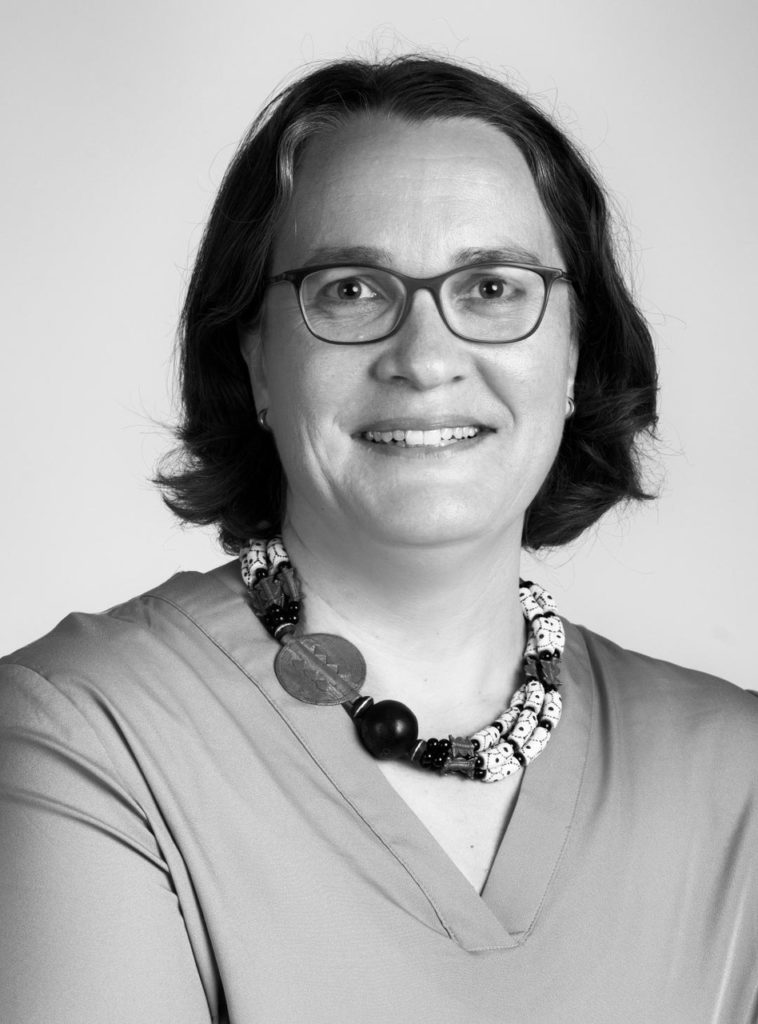
Anne Kröning the new DDR Chief in MONUSCO talks about her experiences and plans for the future.
Why did you choose to work in DDR? How did your career background lead you to become a DDR Chief?
 My first contact with DDR was during an internship at the Pearson Peacekeeping Center (PPC) in Canada, where I was a course assistant for pre-deployment peacekeeping training courses. I found DDR fascinating, the very technical aspects from arms management and disposal to engagement with armed groups and the analysis of the underlying causes of conflict, the political power plays, armed groups positioning themselves within a peace process and so on. I was fortunate to be chosen by the Head of Bunia field office to join her team in 2004. I was employed as Associated Political Affairs Officer and worked with the regional Ituri DDR programme within MONUC in the DRC, where for the first time I contributed in the field to DDR. My experience with the PPC enabled me to work as an independent facilitator for Peacekeeping training and DDR with peacekeeping schools in Rwanda, Ghana, and Mali. Having left MONUC I worked as Country Director and Regional Coordinator for international NGOs and OCHA Head of Sub-Office, as well as Senior Protection of Civilians Advisor for MINUSMA.
My first contact with DDR was during an internship at the Pearson Peacekeeping Center (PPC) in Canada, where I was a course assistant for pre-deployment peacekeeping training courses. I found DDR fascinating, the very technical aspects from arms management and disposal to engagement with armed groups and the analysis of the underlying causes of conflict, the political power plays, armed groups positioning themselves within a peace process and so on. I was fortunate to be chosen by the Head of Bunia field office to join her team in 2004. I was employed as Associated Political Affairs Officer and worked with the regional Ituri DDR programme within MONUC in the DRC, where for the first time I contributed in the field to DDR. My experience with the PPC enabled me to work as an independent facilitator for Peacekeeping training and DDR with peacekeeping schools in Rwanda, Ghana, and Mali. Having left MONUC I worked as Country Director and Regional Coordinator for international NGOs and OCHA Head of Sub-Office, as well as Senior Protection of Civilians Advisor for MINUSMA.
Though you have been appointed only recently DDR Chief in MONUSCO, we would like to hear from you your main priorities in the next period.
 On 5 July 2021, the President of the DRC signed Ordonnance 21/038 instituting the Programme de Désarmement, Démobilisation, Relèvement Communautaire et Stabilisation (P-DDRCS). On 7 August 2021, he further nominated the National Coordinator of the P-DDRCS and his two deputies in charge of administrative and financial, and technical and operational issues. From the lessons learned in the DRC between 2004 and 2018, it emerges that communities and civil society together constitute an important lever for the success and sustainability of any DDR program; thereby explaining the adoption by the Government of a community-based and more holistic approach to DDRCS through P-DDRCS. In addition, the policy and strategy of P-DDRCS, including programs, planning, control, implementation, financing, and coordination mechanisms for DDRCS action remain to be defined and implemented. The United Nations and all the IC present in the DRC thus remain ready to support the implementation of the Ordinance by assisting from its launch. The whole DDR team in DRC is tasked to contribute to the successful launch and implementation of the new P-DDRCS. This also means, that within the DDR Section and MONUSCO, we must be ready to provide requested support and coordination to all partners involved. My arrival in the mission coincides with the institution of the P-DDRCS, which is a unique opportunity but also a challenge for all of us.
On 5 July 2021, the President of the DRC signed Ordonnance 21/038 instituting the Programme de Désarmement, Démobilisation, Relèvement Communautaire et Stabilisation (P-DDRCS). On 7 August 2021, he further nominated the National Coordinator of the P-DDRCS and his two deputies in charge of administrative and financial, and technical and operational issues. From the lessons learned in the DRC between 2004 and 2018, it emerges that communities and civil society together constitute an important lever for the success and sustainability of any DDR program; thereby explaining the adoption by the Government of a community-based and more holistic approach to DDRCS through P-DDRCS. In addition, the policy and strategy of P-DDRCS, including programs, planning, control, implementation, financing, and coordination mechanisms for DDRCS action remain to be defined and implemented. The United Nations and all the IC present in the DRC thus remain ready to support the implementation of the Ordinance by assisting from its launch. The whole DDR team in DRC is tasked to contribute to the successful launch and implementation of the new P-DDRCS. This also means, that within the DDR Section and MONUSCO, we must be ready to provide requested support and coordination to all partners involved. My arrival in the mission coincides with the institution of the P-DDRCS, which is a unique opportunity but also a challenge for all of us.
What advice would you give to other women professionals who want to go into DDR?
 Irrespective of DDR, pursue your goals. Be open minded and keep enriching your professional experiences. Don’t be afraid to think out of the box. Above all, uphold your values of good work, respect and professionalism. Be genuine and honest towards yourself and others to gain trust and respect. Your contribution to the successful implementation of the DDR, no matter how small it might seem, counts. DDR is a huge puzzle, and no piece can be missed.
Irrespective of DDR, pursue your goals. Be open minded and keep enriching your professional experiences. Don’t be afraid to think out of the box. Above all, uphold your values of good work, respect and professionalism. Be genuine and honest towards yourself and others to gain trust and respect. Your contribution to the successful implementation of the DDR, no matter how small it might seem, counts. DDR is a huge puzzle, and no piece can be missed.
How can the participation of women professionals in DDR be increased?
 The United Nations policy and practices to bridge the gender gap and employ more women in male-dominated fields is the way forward, but insufficient. We need to reach out to young university graduates promoting DDR as a complex societal, sustainable, and stabilization tool, that goes far beyond military aspects and arms control. DDR requires qualified experts from a wide range of expertise and backgrounds beyond military experience, such as strategic planners, anthropologists, gender advisors, political scientists, and so many more.
The United Nations policy and practices to bridge the gender gap and employ more women in male-dominated fields is the way forward, but insufficient. We need to reach out to young university graduates promoting DDR as a complex societal, sustainable, and stabilization tool, that goes far beyond military aspects and arms control. DDR requires qualified experts from a wide range of expertise and backgrounds beyond military experience, such as strategic planners, anthropologists, gender advisors, political scientists, and so many more.
In peacekeeping training schools and pre-deployment trainings, women should be encouraged to engage in DDR. Member states and troop-contributing countries should not consider women candidates to merely fulfill their quota on women participation. As we all agree on the key role women and youth play in creating and maintaining sustainable, peaceful societies, we need to integrate this within our own management and recruitment systems. In the end, it’s the mindset that needs to change. Women should continue to pursue their goals and professional and personal endeavors, and recruiters and career managers should enable them to join DDR programmes within peacekeeping missions considering the large variety of expertise required.
You have mentioned that you have three new female UN Volunteers that just started to work in your team, and you are one of the few female chiefs on the field. How do you think having women in leading positions inspires young female professionals?
 I know that for those three ladies, it was very important to have a female chief. I feel that sometimes young female professionals are not taken seriously, not only in DDR but also in the sector. Some of the reasons behind this are their age, the fact that they are UNVs, and women. Because usually, DDR is considered a military issue and that the military sector is reserved for men. I also started my DDR career as a young UNV, so of course, it created some links.
I know that for those three ladies, it was very important to have a female chief. I feel that sometimes young female professionals are not taken seriously, not only in DDR but also in the sector. Some of the reasons behind this are their age, the fact that they are UNVs, and women. Because usually, DDR is considered a military issue and that the military sector is reserved for men. I also started my DDR career as a young UNV, so of course, it created some links.
As a female DDR Chief, how do you intend to foster gender mainstreaming within your team and also the DDR process in DRC?
 We have one UNV who is our gender focal point. She is working closely with the MONUSCO gender advisor. I am also thinking of requesting a DDR gender advisor from the HQ. I believe it is vital now that we have the official political will and the new DDR ordinance that is community-based. That is why, right now, we need to take into consideration the gender role to appropriately engage with the community. There is the need for a gender advisor who is also a programme manager to really improve our gender perspective with our CVR projects.
We have one UNV who is our gender focal point. She is working closely with the MONUSCO gender advisor. I am also thinking of requesting a DDR gender advisor from the HQ. I believe it is vital now that we have the official political will and the new DDR ordinance that is community-based. That is why, right now, we need to take into consideration the gender role to appropriately engage with the community. There is the need for a gender advisor who is also a programme manager to really improve our gender perspective with our CVR projects.
IDDRS Updates
The work on the Integrated Disarmament Standards (IDDRS) has continued. On 15 September, a pre-validation seminar for the level three modules of the IDDRS will be held. The modules in level three focus on practical guidance for the planning, design, and assessment of DDR programmes, including such pertinent questions as budgeting, staffing and the relation with national institutions. They, therefore, have a significant concrete impact on the work of DDR practitioners in the field, and their validation is highly anticipated.
The IDDRS are a comprehensive and detailed set of policies, guidelines and procedures for undertaking DDR. They cover over 30 thematic areas within DDR, ranging from planning, design, monitoring and evaluation through the protection of specific needs groups, such as children, youth and women and mainstreaming of cross-cutting issues, such as health, HIV/AIDS, gender and youth, to linkages with other processes, such as security sector reform (SSR) or transitional justice (TJ). The IDDRS are a repository of lessons and best practices drawn from the experience of all UN entities involved in supporting DDR and are always the subject of broad consultation before becoming accepted as guidance.
IDDRS Modules Status
modulex.xx
In Progress
modulex.xx
To Be Validated
modulex.xx
Completed
level 1
General IDDRS
module1.10
Introduction to the IDDRS
module1.10
Glossary: Terms and Definitions
level 2
Concepts, Policy and Strategy of the IDDRS
module2.10
The UN Approach to DDR
module2.11
The Legal Framework for UN DDR
module2.20
The Politics of DDR
module2.30
Community Violence Reduction
module2.40
Reintegration as Part of Sustaining Peace
level 3
Structures and Processes
module3.10
Integrated DDR Planning: Processes and Structures
module3.11
Integrated Assessments
module3.20
DDR Programme Design
module3.21
Participants, Beneficiaries, and Partners
module3.30
National Institutions for DDR
module3.40
Mission and Programme Support for DDR
module3.41
Finance and Budgeting
module3.42
Personnel and Staffing
module3.50
Monitoring and Evaluation
level 4
Operations, Programmes and Support
module4.10
Disarmament
module4.11
Transitional Weapons and Ammunition Management
module4.20
Demobilization
module4.30
Reintegration
module4.40
UN Military Roles and Responsibilities
module4.50
UN Police Roles and Responsibilities
module4.60
Public Information and Strategic Communication in Support of DDR
level 5
Cross-cutting Issues
module5.10
Women, Gender and DDR
module5.20
Children and DDR
module5.30
Youth and DDR
module5.40
Cross-border Population Movements
module5.50
Food Assistance in DDR
module5.60
HIV/AIDS and DDR
module5.70
Health and DDR
module5.80
Disabilities and DDR
level 6
Linkages
module6.10
DDR and SSR
module6.20
DDR and Transitional Justice
module6.30
DDR and Natural Resources
module6.40
DDR and Organized Crime
module6.50
DDR and Armed Groups Designated as Terrorist Organisations
